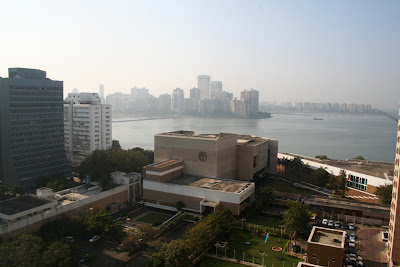Let me take a break from a spreadsheet that is doing my head in and post on a thought I had during a dinner party on Monday evening while the conversation and the Veuve Cliquot Rose flowed..
The good folk around the table were talking in intelligent terms about the pros and cons of Hilary vs Barack. With only superficial knowledge of US politics, I sat and listened and tried to weigh up the opinions that bounced around. And then it occurred to me that the terms of the conversation were in danger of obscuring a more important point - can anyone save America? Save from recession in the first instance, save from being an international pariah (a la Chomsky) in the second instance, but much more fundamentally than both, save from losing its number one superpower status? Relatedly, the other question occluded seemed to be: can the West resist losing being the centre of geopolitical gravity? In the back of my mind was Davos the week before, and the contrast between the gloom of the Western leaders and the zest of the Indian delegation. And how should Westerners respond to this seemingly inevitable gravitational shift?
It was interesting that as soon as I brought the issue up, no one had much to say. It seems that whether you think America/the West needs saving or not, most people succumb to a sense of fait accompli about the process. The sentiment can be summer up as, "we've had our turn, now its China's."
It was at that point that I had a weird Peter Hitchens/Martin Amis moment. My conscious-self regards Christopher's brother as a right-wing reptile slithering under his Daily Mail rock. However, sub-routines of thought apparently deeply buried were now opened to the light. I found myself thinking: hold on, the West has so much to value about itself. Why would anyone capitulate or throw these things away or want to devalue them on the basis of an unconscious historical determinism? What China and India have in their ascendant present is people, cheap labour and weak unionisation, conveniently contextualised in an increasingly global and technology-driven economy which places value on cheap flexible labour. True, just like the West, China and India have millennia of cultural, spiritual and intellectual traditions as the bedrock upon which their contemporary societies sit. However, we cannot simply allow notions such as democracy, human rights and centuries of thought evaporate under an emerging Sino-Indian alignment? Or can we? Or should we?
I guess what happened was I hit a layer of my sub-conscious which is fundamentally structured by a reactive attachment to occidental thought. Perhaps not quite Hitchensian or Amisian, in the sense that even sub-consciously, I am fully aware that the region that generated the notions of democracy, human rights, ideas of liberty and other grounding philosophical and political concepts etc has consistently failed to act out its founding principles, and has most often moved in the opposite direction in a murderously appropriative manner. The point is not to celebrate the West as the place where democracy et al is to be found along with roads paved with gold, against threats from outside. It is rather to ask the question: does the ceding of power to the East also mean the ceding of ethical and political principles that originate in the West? Must the Chinese model now take over wholesale? Is the West prepared to make a stand for principles that it has placed in world circulation?
Maybe it was the champagne doing the speaking, making my thoughts squirm with Nietzschean ressentiment. It just seemed that giving in to historical determinism like this is a denial of collective agency and spirit. Perhaps there's a Hegelian dialectic at work. The West will need to look at itself in externalised terms (through the optic of India and China post-ascendancy - say in 10-20 years) before it returns to its source and recovers confidence and modes of identity. Until then, we are on the track of the anti-thesis, and its down-hill from here. Westerners have nothing to say and nothing that can be said or offered, save to moan about the failing state of their economies and the failing health of the planet...
The last thought I had around the dinner table was: what value-add does China bring to Africa/Nigeria exactly? [Sort of an updated version of the Life of Brian sketch by the People's Front of Judea]. Nigeria doesn't need the money (even if some of the US$50bn forex reserves is already committed, are you telling me there aren't billions to spend still?) Nigeria certainly doesn't need the cheap labour. Nigeria can buy in the infrastructural expertise from the global market. So why would Nigeria go knocking on China's door, apart from based upon the idea that it lacks the will-to-autonomy that both China and India have in abundance right now?
Read more...




















































